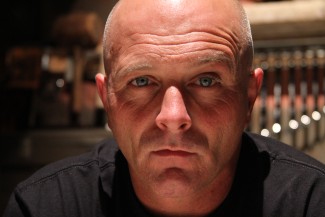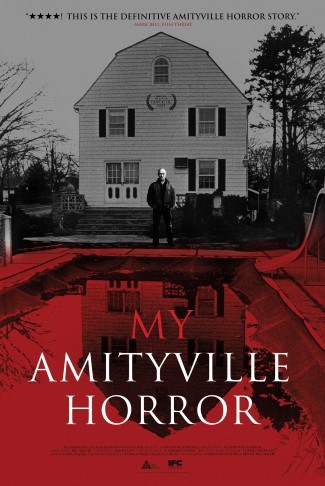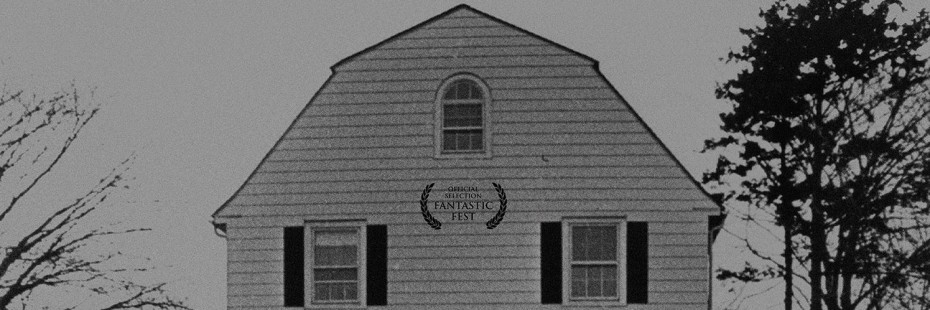INTERVIEW: Revisiting the Amityville Horror through the eyes of a 10-year-old

My Amityville Horror, the new documentary about the infamous Long Island “haunted” house, is the culmination of a long journey of research and compilation for director Eric Walter. He’s a man with a fascination for this unusual case study, a story that has been fictionalized, debated, denounced and interpreted by many outsiders. Walter’s doc gives the viewer a rare inside look at what happened in 1975 when the Lutz family hurriedly left their Amityville house with tales of possession and the supernatural.
Before the filming of the documentary, which follows Daniel Lutz, the oldest of the three children in the house, Walter was a believer in the basics of the story. “I believed, in terms of the Lutz story and their allegations of a haunting, that something happened to this family of an actual unexplained nature,” the director said recently during a phone interview. “I’ve never believed that a family would abandon everything they owned inside this house and flee and return to get pretty much nothing.”
The details are constantly questioned, but the chapter headings are well known to anyone with a passing interest in the macabre. This waterside house with its demonic-looking windows has played host to some very unfortunate circumstances. From the troubling murders of the DeFeo family (just prior to the Lutzes’ arrival) to Daniel and his family fleeing 28 days after they moved in, the house has become noteworthy, much to the chagrin of local residents. Hollywood’s cinematic adaptations only continued the public’s interest in the property.
Daniel Lutz lived through the ordeal, but he hasn’t talked extensively to the public about the incidents in more than three decades. Walter, after a long process of getting to know his subject, filmed the documentary as a series of interviews and encounters where Daniel is able to revisit those fateful days in 1975.
THE POWER OF BELIEF
“I don’t believe that everything that’s been ever said by the Lutz family and by the media about the story has been the truth,” Walter said. “I think so much of it has been lost within so much misinformation about the story.”
The misinformation led Walter to create amityvillefiles.com at the age of 17. The website archives interviews, articles and photos about the Amityville Horror. “I put this together just because there was nothing that really presented an unbiased format, a place where people could make up their own minds about what they believed happened in the house,” he said.
The director knows many of the details by heart: “[T]here are many unexplained occurrences with that as well that haven’t really been cleared up, such as Brian DeFeo being able to murder his entire family inside this house without any of the neighbors hearing it at the time, at least they claimed at the time that nothing was ever heard. No one ever did anything about it, except for a neighbor down the street heard, two doors down had heard the DeFeo sheepdog barking, but no one had heard any of the rifle shots. So there’s so many strange things under one roof that I do think there a lot of truth that surrounds it. That was part of my, I guess, modus operandi, if you will, going forward with it, to try to clear up some of those myths.”
My Amityville Horror presents “the blurry line between reality and imagination, and that’s because that’s how Danny Lutz remembers the events.”
Daniel was 10 at the time of the incidents, and he’s held on to the scars for the rest of his life. “Whether or not you believe it, really isn’t the issue,” Walter said. “The issue is that he believes it.”
The stories from the various family members have spawned many theories. Walter said the only one who hasn’t talked about the incidents to the public is the youngest daughter. “Danny, this is his first time coming out and talking about it at all,” he said. “So, you know, yes he was very guarded. … It’s just something he wanted to do but didn’t want to do. So there was this constant pull where, yes, he was open enough to work with a film crew and to allow me to come in and, you know, try to extract these memories, and kind of more or less had to befriend him through this process. And that was not an easy thing to do.”

In the film, Daniel appears uneasy and hostile, to the point where he seems ready to throw some punches. Telling him that the “supernatural” experiences didn’t happen is probably a bad idea. He’s a believer, and he doesn’t want denials thrown in his face. “I had developed an amount of respect for him obviously for him wanting to do this,” Walter said. “But also you have to respect the fact that he was a child at the time, and in many ways, there’s still a wounded 10-year-old within here.”
Walter considers the film more of a character study about someone with a “very, very intense personality” who has been “more or less indoctrinated within these events.” The hurt and anguish appear to have stayed with Daniel, to the point where he doesn’t fear the original house anymore. There are scenes in the documentary when Daniel walks on the sidewalk near the house in Amityville, and he’s rather cool-headed. The “horror” of the story isn’t tied to the physical structure in Daniel’s mind. The “haunting” happened to the family, he says.
“And he had no fear of going back in the house because his feeling was it wasn’t the house; it was the family,” Walter said.”And that was kind of the greatest revelation, at least from Danny’s perception, that he believed his stepfather, George Lutz, was to blame for what happened. He went as far as to say that if he and his natural father had moved into that house that nothing would have happened there, and that it was wholly triggered [by] George Lutz and his dabblings in occult activity.”
George Lutz, the controversial father figure in the family (the one played by James Brolin in the original movie and by Ryan Reynolds in the remake), was Daniel’s stepfather at the time of the incidents. The two, according to Daniel, didn’t get along, and much of the blame for everything that happened in the house Daniel lays at the feet of George. His stepfather died a few years ago but was no stranger to telling his side of the story to the media.
Walter is not convinced that everything begins and ends with George Lutz, but there is evidence that makes him ponder the proposal. “No family that’s moved into that house since has claimed any kind of paranormal phenomena, so it does make you wonder if it was based in the family,” Walter said. “I mean hauntings in general, if you believe in this sort of thing, you can be very susceptible to a certain amount of this [stuff], and especially since there had been a mass murder in this house. An entire family had been murdered there just one year prior. … I can’t say that the allegations of levitation and possession and all the rest of this can be attributed directly to that. I mean there’s just no way to prove any of that because they were the only people to corroborate their incidents.”
Whether or not George Lutz dabbled in the occult prior to the Amityville incident is a central puzzle of the case. If he had, some may believe that the whole “horror” is a farce, the product of a mind that was fascinated with the supernatural. Others, like Daniel, believe that this supposed occult activity could have opened up some unwanted doors — like a game of Ouija board gone bad.
“I do see also that it’s quite evident in the film and through the interviews with Dan that he absolutely hated his stepfather…” Walter said. “And I think a lot of his statements color his story in the way that it seems convenient to me that he would want to blame his stepfather for everything because, let’s face it, his natural father was removed from the picture at a very early age and replaced by George Lutz, who was an ex-Marine, a very domineering personality. And for me at the end of the day, no matter what you believe — if you believe in the paranormal, if you don’t believe in the paranormal — that isn’t the issue. There was a tumultuous family dynamic going on here at the time, and I think that’s become quite clear through the process of making this film. And honestly for me that was the real Amityville Horror, at least from what I was able to uncover with Danny.”
Walter said he tried to have the other two children to talk about their experiences, but he was denied access. George and Kathy Lutz (they eventually divorced) are now deceased.
“So [the movie] is kind of a post-examination character study on someone who is living in the shadow of something for over 35 years. How does that change your perception on everything? You know, who are you? [Daniel] refers to himself as the ‘Amityville guy’ and complains about George Lutz referring to himself as the ‘Amityville guy,’ and at the same time he’s doing the exact same thing. So it’s kind of a sad and tragic picture when you start to look at this.”
‘THE AMITYVILLE GUY’
Walter said that Daniel used to be a UPS driver and now he’s a stonemason in Whitestone, NY., an area of Queens not too far from Amityville. “He talks about a lot of his friends knew him as Danny Lutz from the Amityville Horror, but other people knew him as Billy or I think Greg was another name,” he said. “That’s interesting because those were character names that were in the fictionalized narrative version of the movie, the original 1979 film and then the remake in 2005. It’s interesting. Obviously this is affecting how he sees himself. I mean he brought it up. This is something that, of course, as documentarians we’re not telling him to say any of this. … I don’t know if Dan watches the film in the same way that you or I may watch it. He sees it as he’s vindicating himself in what he really feels happened with the haunting, which he completely does not question was a reality. At the same time, [there are] a lot of the skeptical viewpoints that are brought into the film to kind of bring an objective look at it.”
Ultimately, Walter reported that Daniel is pleased with the final product, although he hesitated to talk on his subject’s behalf. “It’s a difficult process, trust me, especially where he had to explain it to me in a first-person interview format to the camera.”
One leaves My Amityville Horror with mixed emotions on what to believe and what to second guess. That, in a nutshell, is the so-called Amityville Horror. The stories have taken a life of their own, so much so that confirmation of the original tales is almost a moot point.
Daniel Lutz believes the stories. Does anything else matter?
“I believe that many of his memories come from somewhat of reality but have been skewed by the snowball effect of the media that happened on this story, and there’s been nothing but movies and books and all this surrounding him,” Walter said. “What does this kid really remember? What really happened to this person? … It’s frustrating for some people. Of course, in a documentary you want to corroborate. You want to show evidence that this was true. … I believe that something very real did happen to this family, but again it’s been lost in so much myth that surrounds it.”
By John Soltes / Publisher / John@HollywoodSoapbox.com
-
My Amityville Horror is currently playing in select theaters and video on demand.

